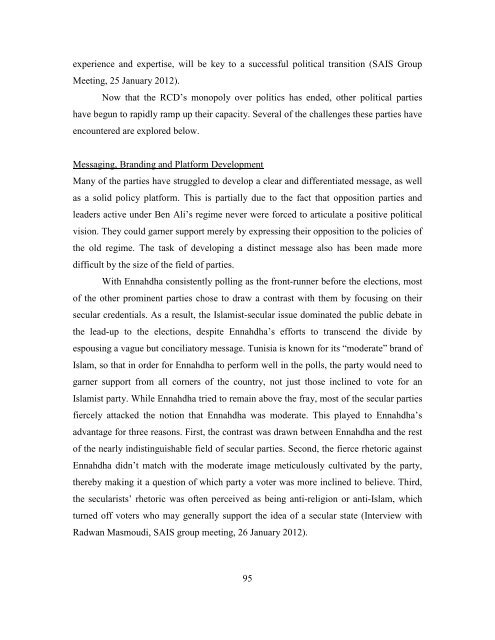Tunisia: Understanding Conflict 2012 - Johns Hopkins School of ...
Tunisia: Understanding Conflict 2012 - Johns Hopkins School of ...
Tunisia: Understanding Conflict 2012 - Johns Hopkins School of ...
Create successful ePaper yourself
Turn your PDF publications into a flip-book with our unique Google optimized e-Paper software.
experience and expertise, will be key to a successful political transition (SAIS Group<br />
Meeting, 25 January <strong>2012</strong>).<br />
Now that the RCD’s monopoly over politics has ended, other political parties<br />
have begun to rapidly ramp up their capacity. Several <strong>of</strong> the challenges these parties have<br />
encountered are explored below.<br />
Messaging, Branding and Platform Development<br />
Many <strong>of</strong> the parties have struggled to develop a clear and differentiated message, as well<br />
as a solid policy platform. This is partially due to the fact that opposition parties and<br />
leaders active under Ben Ali’s regime never were forced to articulate a positive political<br />
vision. They could garner support merely by expressing their opposition to the policies <strong>of</strong><br />
the old regime. The task <strong>of</strong> developing a distinct message also has been made more<br />
difficult by the size <strong>of</strong> the field <strong>of</strong> parties.<br />
With Ennahdha consistently polling as the front-runner before the elections, most<br />
<strong>of</strong> the other prominent parties chose to draw a contrast with them by focusing on their<br />
secular credentials. As a result, the Islamist-secular issue dominated the public debate in<br />
the lead-up to the elections, despite Ennahdha’s efforts to transcend the divide by<br />
espousing a vague but conciliatory message. <strong>Tunisia</strong> is known for its “moderate” brand <strong>of</strong><br />
Islam, so that in order for Ennahdha to perform well in the polls, the party would need to<br />
garner support from all corners <strong>of</strong> the country, not just those inclined to vote for an<br />
Islamist party. While Ennahdha tried to remain above the fray, most <strong>of</strong> the secular parties<br />
fiercely attacked the notion that Ennahdha was moderate. This played to Ennahdha’s<br />
advantage for three reasons. First, the contrast was drawn between Ennahdha and the rest<br />
<strong>of</strong> the nearly indistinguishable field <strong>of</strong> secular parties. Second, the fierce rhetoric against<br />
Ennahdha didn’t match with the moderate image meticulously cultivated by the party,<br />
thereby making it a question <strong>of</strong> which party a voter was more inclined to believe. Third,<br />
the secularists’ rhetoric was <strong>of</strong>ten perceived as being anti-religion or anti-Islam, which<br />
turned <strong>of</strong>f voters who may generally support the idea <strong>of</strong> a secular state (Interview with<br />
Radwan Masmoudi, SAIS group meeting, 26 January <strong>2012</strong>).<br />
95
















